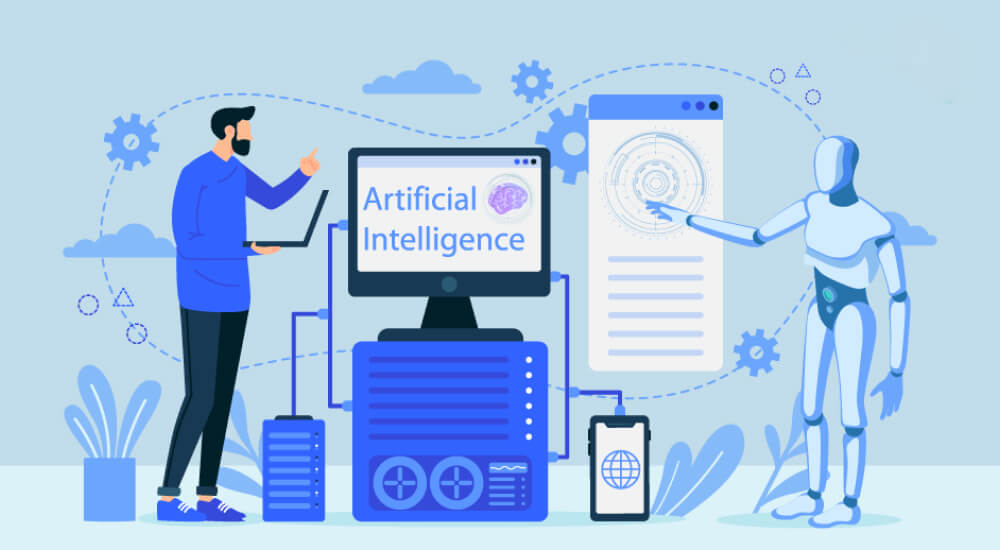The Role of Artificial Intelligence in Enhancing Customer Service Quality

Artificial Intelligence (AI) has become a buzzword in today's world, transforming the way businesses operate. In simple terms, AI refers to the ability of machines to imitate human intelligence, including learning, problem-solving, and decision-making. Businesses are increasingly adopting AI technology to improve their operations, enhance customer service quality, and boost productivity. For instance, AI-powered chatbots are replacing human customer service representatives in answering frequently asked questions, and AI-based predictive analytics is helping companies better understand their customers' needs and preferences.
Customer service is a critical aspect of any business, but the current customer service ecosystem is facing significant challenges. According to a study by HubSpot, 90% of customers rate an "immediate" response as essential when they have a customer service question. However, the average response time for companies is usually very high, leading to customer frustration and dissatisfaction with customer service.
AI can be utilized as the initial point of contact for customers at every touchpoint with a brand. With the assistance of AI, customer service agents can deliver high-quality service. AI can also provide 24/7 customer support, which is not possible for humans to achieve. A study by Salesforce found that 64% of customer service teams believe that chatbots and virtual assistants have improved their customer service capabilities.
The future of customer service will be defined by artificial intelligence in the following ways:
Omni-channel service experience:
One of the ways in which artificial intelligence is defining the future of customer service is through enabling an omnichannel service experience. AI-powered chatbots and virtual assistants can seamlessly integrate with various channels, such as social media, phone calls, and email, to provide a consistent and high-quality support experience to customers. By leveraging natural language processing (NLP) and machine learning (ML), AI-powered chatbots can understand and respond to customer queries and concerns across different channels in real-time. This eliminates the need for customers to repeat their concerns multiple times, as the chatbot can transfer the context seamlessly across channels.Moreover, AI-powered chatbots can also integrate with other customer service tools, such as knowledge management systems and CRM systems, to access relevant customer information and provide personalized support. This ensures that customers receive quick and accurate responses, regardless of the channel they use to contact the brand.
One-on-one conversations
Customers prefer one-on-one conversations with customer support teams, regardless of the service channel. Real-time messaging with a support agent is becoming increasingly popular, surpassing emails and other automated or generic conversations. This is why artificially intelligent chatbots are gaining prominence over other bots. AI chatbots can provide a human touch to conversations without needing a human on the other side of the screen. Ultimately, a personalized and seamless customer service experience is crucial for customer loyalty and satisfaction.
Monitoring of core business metrices
Maintaining high levels of customer service quality is vital for businesses to succeed in today's competitive marketplace. To achieve this, businesses need to track both qualitative and quantitative measures, including customer satisfaction scores (CSAT), average handling time (AHT), first-time resolution (FTR), and other key performance indicators (KPIs).
Artificial intelligence (AI) can play a crucial role in improving customer service quality and monitoring and controlling quality. With AI-powered analytics and reporting, businesses can track and analyze customer interactions across multiple channels, identify areas for improvement, and gain insights to optimize customer service processes. By leveraging AI, businesses can better understand customer needs and preferences, make data-driven decisions, and take action to improve customer service quality.
Scaling Customer Service Operations with AI Assistance
One way AI is helping to improve customer service quality is by automating and streamlining processes. AI-powered chatbots and virtual assistants can handle routine customer inquiries and provide quick, accurate responses 24/7. This can help to reduce AHT and improve FTR, as customers can get the information they need without waiting on hold or speaking to a live agent.
Another way AI is improving customer service quality is by analyzing customer feedback and sentiment. AI-powered tools can analyze customer feedback across multiple channels, such as social media, email, and chat, to identify trends and areas for improvement. This can help businesses to address customer issues proactively and improve CSAT scores.
AI can also help businesses scale their customer service operations. By automating routine tasks and providing insights to optimize processes, businesses can handle a larger volume of customer inquiries without sacrificing quality. This can help businesses to grow and expand their customer base while maintaining high levels of customer satisfaction.
Balancing AI and Human Expertise
As artificial intelligence takes on a larger role in resolving smaller customer queries, customer service agents will be left to focus on high-priority and complex issues. While this may reduce their workload, it also means that agents need to be highly skilled and well-trained to handle these more complicated situations effectively. AI can still assist agents in making better decisions and providing personalized solutions. Still, agents must receive comprehensive training to handle these complex issues confidently and competently. In addition to technical knowledge, agents must develop strong problem-solving and critical thinking skills to address the diverse customer concerns they may encounter effectively. The best part of AI is it can assist in the agents' training procedure as well, making the process of delivering quality customer service very easy.
To conclude
Artificial intelligence has enormous potential to transform the customer service industry. By providing quick and personalized support, automating routine tasks, and analyzing customer feedback, AI can significantly improve customer service quality, enhance operational efficiency, and increase customer satisfaction. However, businesses must ensure that they use AI in a responsible and ethical manner and balance the benefits of automation with the need for human interaction.
CX First is an AI-backed 360° approach to boost your customer service team's performance and improve CX. It takes a holistic approach by targeting the core challenges that hinder the growth of your contact center, enabling you to achieve operational and CX excellence. Want to know more? Book a Demo!